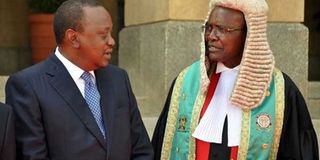Each one of us must respect separation of powers

Chief Justice of the Supreme Court David Maraga (right) with President Uhuru Kenyatta during the official presentation of the State of the Judiciary and Administration of Justice Report 2016/2017 at the Supreme Court Building on December 15, 2017. PHOTO | FILE | NATION MEDIA GROUP
What you need to know:
- Over the past six years, both the government and the opposition have openly criticised the Judiciary, depending on whether or not they agreed with court decisions in cases they considered vital.
- Mr Raila Odinga termed the Supreme Court as bandia (fake) while President Uhuru Kenyatta is on record calling the Supreme Court wakora (frauds) in 2017.
- Many believe that the 2007-2008 post-election violence happened because a section of the country did not have faith in the courts
The Executive and Judiciary seem to be on a collision course, especially after Cabinet Secretary Raphael Tuju wrote a strongly worded letter to the Chief Justice complaining of alleged judicial bias.
Then there was Justice Luka Kimaru’s ruling that indicted the police and Immigration leadership for contempt of court and his pronouncements faulting and quashing Miguna Miguna’s deportation to Canada.
This comes a week after the Inspector-General of Police, Director of Criminal Investigations, Cabinet Secretary for Interior, Cabinet Secretary ICT and the Communications Authority of Kenya collectively ignored or failed to honour several court orders relating to Mr Miguna’s arrest and the shutdown of the main TV stations.
Any historian or legal practitioner will tell you that the rule of law is paramount in any civilised society. It is the principle that law, guided by the constitution, should govern a nation, as opposed to being governed by decisions or whims of government officials. In Kenya, the 2010 Constitution spells out the roles to be played by different creatures of government.
EQUAL PROTECTION
It is noteworthy that Article 27 provides that every person is equal before the law and has the right to equal protection and equal benefit.
This means that every citizen – regardless of class, sex, gender, religion, tribe and race – is subject to the law, including government officials who wield executive power on our behalf.
Separation of powers refers to the division of government duties and responsibilities into separate branches to prevent any one from exercising the functions of another.
The intent is to provide for checks and balances because of the innately corrupting nature of power.
In this arrangement, Parliament, made up of the Senate and the National Assembly, is responsible for enacting laws and allocating monies; the Executive is responsible for implementing public policy and protecting life and property; and, the Judiciary is responsible for interpreting the constitution and laws and administering justice.
UNIMAGINABLE PAIN
Other important cogs in our unique system of checks and balances are Constitutional Commissions and independent offices that play various roles.
These include the Ethics and Anti-Corruption Commission, the Kenya National Commission on Human Rights, the National Land Commission, the Judicial Service Commission, the National Police Service Commission, the Salaries and Remuneration Commission, the National Gender and Equality Commission, the Commission on Administrative Justice, the Auditor-General and the Director of Public Prosecutions.
Kenya’s history is replete with stories of Executive excesses that caused unimaginable pain and suffering to citizens through marginalisation and discrimination, torture, killings, malicious prosecutions and holding suspects incommunicado merely because they held divergent views from those in government.
During those dark times, the Judiciary was in sync with the Executive and thus directly or indirectly facilitated these atrocities. Our current constitutional design seeks to buttress and protect the Judiciary from State capture for this very reason.
FAKE
Over the past six years, both the government and the opposition have openly criticised the Judiciary, depending on whether or not they agreed with court decisions in cases they considered vital. After the 2013 presidential petition, Mr Raila Odinga termed the Supreme Court as bandia (fake) while President Uhuru Kenyatta is on record calling the Supreme Court wakora (frauds) in 2017. It is natural to be in disagreement with some court decisions. However, what you do after that makes all the difference.
No matter how much someone feels aggrieved with a judicial decision or court order, the civilised thing to do is to comply and appeal.
Our leaders, especially those who draw their authority from the Constitution, should be careful not to appear to encourage disrespect or apathy towards the courts because the Judiciary is the only organ charged with administering justice in criminal, civil or constitutional matters.
FORMAL COMPLAINTS
In fact, many believe that the 2007-2008 post-election violence happened because a section of the country did not have faith in the courts. Let us not take Kenya back to this frame of things especially when the ethnic and political divide is palpable.
Additionally, our laws have provisions that allow parties to lodge formal complaints to JSC regarding the conduct of judges. These channels should be used as opposed to public pronouncements and disregarding court orders that a party does not feel are proper.
Demas Kiprono is Senior Legal Officer - ARTICLE 19 Eastern Africa [email protected] Twitter: @kipdemas





